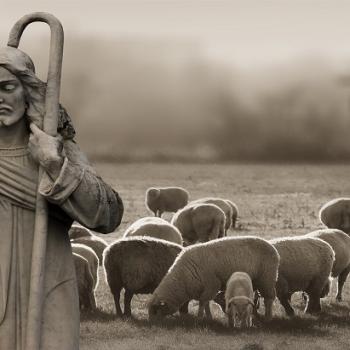I strive to look at opposing viewpoints while writing for Patheos, to gain a more objective view of topics. Because of this, I came across a new video from Alisa Childers, a prominent Christian apologist. After watching her video addressing the extreme Progressive Christian views she recently discovered, I agreed with a few of her points. I took a look at the site she mentioned, and it gave me a bit of a “faith identity crisis” afterward.
In this video, Alisa breaks down the “8 Points of Progressive Christianity” that she came across on ProgressiveChristianity.org.
Point Taken!
Becoming a writer for Patheos has made me continually question where I stand on the “spectrum” of Christianity. For the most part, my views are genuinely progressive, especially when it comes to affirming LGBTQ+ individuals and relationships. But I also believe that Progressive Christianity is more of an umbrella term than anything else, without a sole definition.
After watching Alisa’s video and reading over these “8 Points”, I don’t know if I want to keep describing myself as a Progressive Christian. I’m not too fond of generalization, and I’m suspicious of the possibility that ProgressiveChristianity.org claims to be generally speaking for all of us. While I do agree with a few of their “8 Points”, there are a couple that I found repulsive.
I take the biggest issue with Points 2 + 5. Respectively, these dictate that Jesus isn’t the One Way that He says He is and that it’s better to question than to be certain.
Other religions do strive to teach others to do good to one another. In that, they have some value. But Jesus is the One Way nonetheless because He’s the one who defeated Death. I also believe that Jesus cares about people of other faiths, that He finds ways to speak to them too. So much happens beyond our ability to see, and Jesus isn’t bound by human limitations when it comes to helping people.
When it comes to the debate between certainty vs. uncertainty, I need certainty. Something I needed an absolute answer to was the fate of suicide victims. God provided me with multiple powerful experiences to assure me that my old school friend, Will, had found his peace. I desperately needed this answer, and it wasn’t an answer that I could’ve found in Protestantism.
I’ve been on a path of reconstruction, and on this walk, I’ve encountered debates over things I’ve always taken for granted. One of these is a disturbing look at Jesus’ sacrifice on the Cross.
Atonement Issues
A term that I’ve seen tossed around about Jesus is “cosmic child abuse”. This is the notion that God the Father cruelly tortured and killed His Son for no reason.
“Cosmic child abuse”, ultimately, is a fallacy that blindly ignores this verse spoken by Jesus in the Gospel of John:
“No one takes it from me, but I lay it down of my own accord. I have authority to lay it down, and I have authority to take it up again. This charge I have received from my Father.” (John 10:18)
When I was browsing ProgressiveChristianity.org to get a better feel of their beliefs, I found this article on substitutionary penal atonement. In it, the author tells a story featuring 3 main characters in a concentration camp: an incarcerated Polish sergeant, a Franciscan priest, and a bloodthirsty Nazi commander.
In the story, when the sergeant is about to be executed, the Franciscan priest lays down his life in place of his. The author associated God the Father with the Nazi commander, comparing the commander’s cruel wrath with God’s “wrath” against sin. This is a dangerous misunderstanding of who God is.
For this article of mine, I happened to find a rebuttal of “cosmic child abuse” written by Alisa Childers. In her article, Alisa correctly defines God’s wrath as justified retribution against sin. God didn’t violently kill his only Son out of tyrannical anger; He and Jesus agreed to pull a brilliant trick over Death by committing the ultimate act of love.
It’s alarming that people argue that Jesus’ self-planned sacrifice is akin to child abuse. This is up there with willfully ignoring everything the Bible says about Hell, including the warnings spoken by Jesus Himself.
Aw Heck!
When I wrote my article on Hell, I stated my belief that Hell was originally intended only for the Devil and the fallen angels. I know that Alisa and I don’t see eye-to-eye on many things, so I’m shocked that our views on Hell seem to align. Hearing Alisa quote this verse from Matthew gave me an odd sense of validation:
“Then He will say to those on His left, ‘Depart from me, you cursed, into the eternal fire prepared for the devil and his angels.” (Matthew 25:41)
Something else that interests me here is Alisa mentioning the “gnashing of teeth” repeated throughout the Bible. She provides crucial context that explains the gnashing: rage. Raging against God in Hell is something seen in the Medjugorje testimonies.
It’s completely understandable to feel apprehensive about discussing Hell; it’s not a fun topic. But it’s become perhaps the biggest elephant in the room. Refusing to talk about Hell helps nobody. This is a common denominator in extreme faith ideations, including this brand of Progressive Christianity.
This brand of Progressive Christianity has a foil (a contrasting partner with stark similarities). I see an unfortunate parallel between this version of faith and the “Prosperity Gospel”, which distorts Bible verses into something they’re not, a package of false promises.
Prosperity Issues
While I usually don’t agree with many of the stances taken by The Gospel Coalition, I do appreciate their definition of the Prosperity Gospel. The Prosperity Gospel provides people with false hope, saying that God rewards faith with worldly gain. Some teachers, such as Joel Osteen, also mix in New Age beliefs such as the notion that our thoughts can create a positive reality. That’s delightful unless you’re somebody like me, who deals with depression!
I found this video collaboration by Melissa Dougherty and Mike Winger, apologists similar to Alisa Childers:
While watching the clips provided in this video, I got a bad vibe from Joel Osteen’s teachings. It’s hard to describe, but something feels “off” about it. I can see why Melissa Dougherty and Mike Winger addressed his teachings; they really do give off a red flag. These teachings put a false light on the reality of suffering.
Once again, my favorite video game of all time, Silent Hill 3, provides a relevant analogy. As Heather, the protagonist, puts it bluntly, “suffering is a fact of life”:
“Listen, suffering is a fact of life. Either you learn how to deal with that, or you go under.” -Heather Mason, Silent Hill 3
God never promised us a life free of suffering. He walks with us in our suffering, lifting us up when we feel like we can’t go on.
There’s a possibility that mishandling the reality of suffering can lead us to dangerous New Age beliefs that ultimately distort our faith.
Addressing the New Age
Melissa Dougherty also did a video on the dangers of promoting a “New Age Jesus”, one made to suit our purposes rather than the message of the Gospel:
We must all take care to avoid diminishing Jesus. When others state that Jesus is “one of many” instead of “The One”, we diminish His divinity. This view falls away from the definition of Christianity into something else entirely.
This might come across as harsh, but I see real parallels between the views of the Prosperity Gospel, legalism, and this extreme version of Progressive Christianity. These ideologies provide a false view of God, while also cherry-picking Bible verses to suit their agendas. In some cases, such as when it comes to hard topics like the existence of Hell, they seemingly gloss over what Jesus says about it. Again, refusing to talk about the hard topics helps nobody.
Progressing Onward
Something I need to continually remind myself is the fact that religiously speaking, I’m quite privileged. I’ve never experienced any kind of religious/spiritual trauma like others have. The United Methodist churches I grew up in were stable, full of integrity, and left me with a strong desire to see justice done for all without partiality.
There’s a chance that religious/spiritual trauma is part of why people cling to these beliefs. I have no idea what it’s like to leave an abusive church/religious life, and I’m sure that this must be a breath of fresh air for those who escape. Ultimately, I might never know what it’s like to walk in their shoes and fully understand what led them to these conclusions.
I strive to be as empathetic as I can be. Because of this, I don’t want to snidely assume that I know all the details of their lives.
With that being said, I don’t know if it’s still appropriate to call myself a Progressive Christian. That is if these “8 Points” are what’s seen on both sides as the objective definition for this version of faith.
Believe It!
My beliefs seem to align most with the beliefs of the author of GayChristian101, the site that encouraged me to truly take Jesus into my heart. I also see myself aligned with Brenda Davies, the author of the God is Grey YouTube Channel.
Brenda has the right way of viewing Progressive Christianity. Progressive Christianity is supposed to be a movement, a safe space where we can voice our questions without fear of reproval.
But Brenda also says in this video that she, like myself, is only one Progressive Christian speaking for herself. This is in stark contrast to the attitude I’ve seen on the site ProgressiveChristianity.org. I’ve glanced at their Facebook page, and read the comments on some of the posts (something we really should limit!).
In one post about unlearning certain religious beliefs (deconstruction), multiple commenters referred to those who expressed disagreement with the post as “fundamentalists”. One commenter refuted somebody who mentioned Jesus’ rising from the dead, telling him that Jesus rising was “metaphorical”. This same person referred to the idea of having a personal relationship with Jesus as “a literal non-sense”.
I’ve been watching several videos from Alisa Childers and Melissa Dougherty about their views on Progressive Christianity. I think this extremism is what they’ve been talking about. As a Christian with progressive views, I’m repulsed by groups that deny Jesus’ divinity and sacrifice/resurrection while also calling themselves “Progressive Christians”.
I want to be diplomatic, but I also need to distance myself from these views. So much of what I read on ProgressiveChristianity.org distorts who God is and comes across as false prophecy. It also really bothers me that both sides in this debate seem to generalize every Progressive Christian under this flag.
Identity Crisis
I never thought I would have common ground with Christian apologists, but here we are. My goal is to objectively know what the entire story is about all of the challenging issues in the Bible. I need to know these answers with absolute certainty, with no exceptions.
This is why ProgressiveChristianity.org‘s “5th Point”, the one about preferring uncertainty over certainty, bothers me so much. Not having certain answers cripples me. To me, dwelling in uncertainty is the same as creating a house that’s bound to fall (Luke 6:47-49).
The adherents of ProgressiveChristianity.org are absolutely entitled to their beliefs. I do agree with some of their views, specifically the ones about practicing what we preach, encouraging community, and seeking justice for all. But I still have to distance myself from their takes on Jesus that diminish Him from God Incarnate to a mere teacher.
I’ve been referring to myself as a “Neutral Good Christian” for a while. That is to say, somebody who respects structure and simultaneously appreciates what we can learn as individuals walking with God. I might be using this moniker now, to avoid being associated with beliefs I can’t entirely agree with.
When I first started writing this article, I had a “faith identity crisis” over this mixup of views. Here at the end of it, I feel far more convinced of my faith and less lukewarm than I used to be. So I guess there’s that!
Featured Image by raheel9360/Pixabay
Hello, and thank you for supporting my work here on Patheos! If you’d like to support me further, please feel free to “Buy Me A Coffee” here:
















